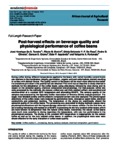Please use this identifier to cite or link to this item:
http://www.alice.cnptia.embrapa.br/alice/handle/doc/1039291Full metadata record
| DC Field | Value | Language |
|---|---|---|
| dc.contributor.author | TAVEIRA, J. H. Da S. | pt_BR |
| dc.contributor.author | BORÉM, F. M. | pt_BR |
| dc.contributor.author | ROSA, S. D. V. F. da | pt_BR |
| dc.contributor.author | OLIVEIRA, P. D. | pt_BR |
| dc.contributor.author | GIOMO, G. S. | pt_BR |
| dc.contributor.author | ISQUIERDO, E. P. | pt_BR |
| dc.contributor.author | FORTUNATO, V. A. | pt_BR |
| dc.date.accessioned | 2016-03-02T11:11:11Z | pt_BR |
| dc.date.available | 2016-03-02T11:11:11Z | pt_BR |
| dc.date.created | 2016-03-02 | pt_BR |
| dc.date.issued | 2015 | pt_BR |
| dc.identifier.citation | African Journal of Agricultural Research, v. 10, n. 12, p. 1457-1466, March, 2015. | pt_BR |
| dc.identifier.uri | http://www.alice.cnptia.embrapa.br/alice/handle/doc/1039291 | pt_BR |
| dc.description | During coffee drying, different temperatures applied to the beans with varied humidity content levels can interfere in the membranes integrity, germination, organic acid and carbohydrate content resulting in coffees with distinct flavors. The quality control of the beans will be much more effective the earlier the alterations provoked in the postharvest are detected. This work has an objective to study alternative methods for the dehydration o f the coffee beans using ultra-drying followed by slow drying and its impact on the sensorial quality, chemical composition and physiology. For that purpose, coffee lots were processed by the methods, dry (natural coffee) and wet (fully washed coffee); and sun-dried and machine-dried at a constant 60°C temperature and alternating 60/40°C. The sensory quality of the samples was assessed by the Specialty Coffee Association of America (SCAA) analysis protocol. The sugar, total titratable acidity and the phenolic compound content was also analyzed. The physiological alterations of the coffee beans were analyzed by germination tests, emergence speed index, electrical conductivity and potassium leaching. The temperature of the drying air significantly altered the sensorial quality of the coffee beans. The processing way associated to drying methods causes many physiological alterations with the highest damage observed in the natural coffees. For the first time, we are showing that drying with heated air at 60/40ºC is promising for the fully washed coffee beans, which are more tolerant to dehydration than the natural coffee beans. Conversely, the natural coffee beans were much more sensitive to drying regardless the temperature, with very low performance in the physiological analyses. The drying at the constant 60ºC temperature is inappropriate for the natural coffee as well as for the fully washed coffee beans. In addition, the physiological tests used were shown effective for the early evaluation of coffee beans quality. | pt_BR |
| dc.language.iso | eng | eng |
| dc.rights | openAccess | eng |
| dc.subject | Processing | pt_BR |
| dc.title | Post-harvest effects on beverage quality and physiological performance of coffee beans. | pt_BR |
| dc.type | Artigo de periódico | pt_BR |
| dc.date.updated | 2016-03-04T11:11:11Z | pt_BR |
| dc.subject.thesagro | Coffea Arábica | pt_BR |
| dc.subject.nalthesaurus | Sensory evaluation | pt_BR |
| dc.subject.nalthesaurus | Drying | pt_BR |
| dc.subject.nalthesaurus | Chemical composition | pt_BR |
| dc.subject.nalthesaurus | Germination | pt_BR |
| riaa.ainfo.id | 1039291 | pt_BR |
| riaa.ainfo.lastupdate | 2016-03-04 | pt_BR |
| dc.contributor.institution | JOSÉ HENRIQUE Da S. TAVEIRA, UEGO; FLÁVIO M. BORÉM, UFLA; STTELA DELLYZETE VEIGA F DA ROSA, SAPC; PEDRO D. OLIVEIRA, UFLA; GERSON S. GIOMO, IAC; EDER P. ISQUIERDO, UEMT; VALQUÍRIA A. FORTUNATO, UFLA. | pt_BR |
| Appears in Collections: | Artigo em periódico indexado (SAPC)  | |
Files in This Item:
| File | Description | Size | Format | |
|---|---|---|---|---|
| Postharvesteffectsonbeverage.pdf | 343,37 kB | Adobe PDF |  View/Open |









